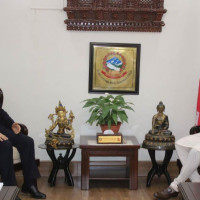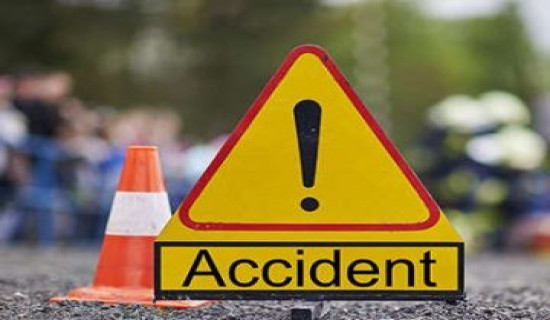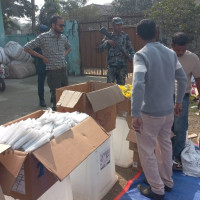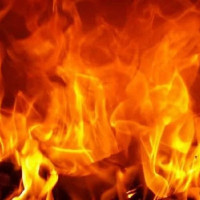- Thursday, 26 February 2026
Call For Comprehensive Reforms In Politics
Nearly 17 years after the abolition of the monarchy, a section of the people have demanded the restoration of the monarchy and a Hindu state. Last month, pro-monarchy and pro-republican forces came to the streets simultaneously to advance their opposing agenda. The pro-monarchy protest turned violent, leaving two individuals dead, dozens injured, and a significant loss of property. The government, in response, clamped a curfew in a few places in the capital. While the government and opposition parties accused monarchical forces of inciting violence and destruction, royalists claimed that the ruling parties had infiltrated their protests to discredit their movement. With further protests announced, the issues seem far from over.
In early March, thousands flooded the streets of Kathmandu to welcome the former king’s return to the capital from Pokhara, an event that not only stirred domestic politics but also drew international attention. Voices for abolishing the current secular federal republic set up, for which people had waged an uprising in 2006, have risen in Nepali political discourse. While the protests seem to have been driven by calls for the monarchy’s return, they stem from a deeper sense of disillusionment with the functioning of the current political system and a widening political divide. Given this, it would be no mistake to say that Nepal yet again stands at its critical political crossroads.
Dramatic changes
Nepal’s political journey has seen dramatic changes over the past decades. The movement of 1990 brought down the party-less Panchayat system and replaced it with a multi-party system. Following the Maoist insurgency, the April Uprising led to the overthrow of 240-year-long monarchical rule and established Nepal as a federal republic. These shifts were monumental in reshaping Nepal’s governance structure, but in the real sense of the term, the promise and delivery of democratic ideals have faced multiple setbacks. Nepal’s politics continues to be impeded by frequent instability and endless challenges in implementing democratic values and ideas. The protest this time, yet again, for a change of system, is a culmination of never-ending disappointment with the political parties and their inability to deliver for the common good.
Since becoming a republic, Nepal has experienced frequent changes in government, mostly formed through fragile coalitions. The change in governments and the power-sharing agreements between them have stood as a hurdle to implementing meaningful reforms or addressing people’s aspirations for development. This has largely impacted the country’s economy. Since the onset of the Maoist movement in 1996 until 2023, Nepal's economic growth has averaged only 4.2 per cent. The economy has struggled to create sufficient job opportunities for the country’s young population, resulting in an unemployment rate of 12.6 per cent and a rising trend of youth migrating in search of better prospects, resulting in the loss of productive human capital.
State resources and agencies continue to be concentrated in the hands of a few, directly impacting the functioning of democracy, fueling frustration against political parties, and eroding trust in the democratic process itself. While civic awareness has increased, ironically, many still find themselves struggling for basic services and feel disenfranchised and disconnected from the state. Most of the public frustration stems from what is seen as a disconnect between political promises and service delivery. Nearly every sector in Nepal, be it health care, education, or law enforcement, is affected by inefficiencies and misuse of power.
The crisis that Nepal faces is not the making of one political party or administration but a collective failure of almost all political parties that have come to power. A generation in Nepal has grown up witnessing revolutions, transitions, regime changes and constitutional overhaul, only to inherit a reality marred by unemployment, poor governance and ineffective service delivery. The dream of Naya Nepal - a transformed state - has been reignited time and again, only to be dimmed by unfulfilled promises. The current wave of protests is, therefore, not merely a political outcry; it is a powerful expression of collective despair with a political class and political culture that has repeatedly prioritised power over people and self-interest over national progress.
Disappointment
Those joining the pro-monarchial protest have vented their disappointment with the working style of the government and the political parties. A return to monarchy would undoubtedly be a regressive step and certainly not a cure for Nepal’s deep-rooted political problems. The movement in its own is deeply divided by conflicting visions and fragments within the royalists on what a restored monarchy should look like. This lack of clarity makes it difficult to present a credible alternative to the existing republican framework. Nepal has an inclusive democratic system as envisioned in the 2015 constitution; the challenge, however, lies in strengthening its foundations. The focus also needs to be on reforming political culture and ensuring better governance.
Rather than changing the system altogether, the focus needs to be on reforming political culture and ensuring better governance. For this to materialise, the parties need to instill new vision, discipline and honesty in the way politics is practiced. We need politicians who are action-oriented and policy-driven rather than personality cult and self-interest. A new wave of reform won’t come from past nostalgia, nor will blind adherence to ideology or personality do any wonders. It will come from accountability, strong democratic institutions and respect for the rule of law. Nepalis have been yearning for change, stability and progress. For the country to move forward, it is high time we invested in building strong democratic institutions, uphold the rule of law, and make space for younger, visionary leadership.
(The writer is a university lecturer, specialising in conflict and peace studies. bhatta.meena@gmail.com )





-square-thumb.jpg)







-original-thumb.jpg)


